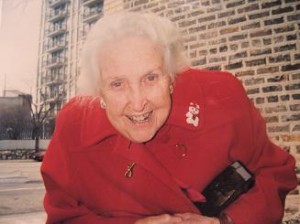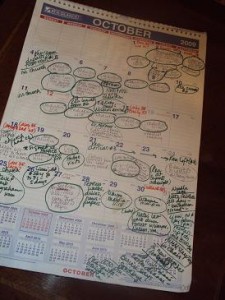The minute Nate and I learned of his cancer diagnosis, I wanted to talk to Mom, but she died in 2005. I knew she would have delivered wise counsel as our feet left the edge of the cliff we’d just been pushed from. She didn’t mince words or say flowery things that would perfume over the truth. And at that moment, I wanted the truth, raw as it might be. I craved her empathy and wanted to ask what I should do next.
As Nate and I sat looking out the van windshield on our drive back to Michigan that day, stunned by what we’d just heard, I needed someone who’d already traveled through hardship to come alongside and whisper wisdom into my ear. The unsatisfied longing to talk to Mom popped up again and again during the six tumultuous weeks of Nate’s illness. Oh how I yearned for her advice, her leveling. But as the old proverb says, “Wishing doesn’t make it so.”
Today, however, I heard from Mom. It happened in a most unlikely way, and I view it as God’s gentle plan to fill up the pothole of longing in my heart.

A friend from childhood named Al who often comments on my blog, mentioned the close relationship our two mothers had had. These women raised their children together so closely, the kids grew up thinking they were all cousins. When Al’s father died, his mother, Ione, received a long letter from my mother, written four days after the death. The letter was meaningful enough to save for 43 years and was re-read again and again.
Today both of those women are gone, but the letter isn’t. Al thought it would hearten me now, in my new life-assignment without Nate, so he mailed me a copy. When I opened his envelope this morning, the first thing I saw was Mom’s familiar handwriting on four pages of stationary. That alone made me smile.
I set aside the letter for a quiet moment later on, eventually sitting down with a mug of cranberry tea and an eagerness to hear from Mom. I read it twice, thinking of the sweet relationship between these two women. Then it occurred to me that since I believe God put the letter into my hands to help me, too, I would read it one more time as if Mom had written it directly to me, a new widow just like Ione had been. And from the letter, here is the gist of her counsel after she began with, “Dear, always-brave [Margaret]” :
- Think back at least three generations and count your blessings. Thank God for “stoic, loyal, living examples of the Scriptures – steadfast, immoveable, always abounding in the work of the Lord. Bless the memory of those who lived long, long ago.”
- Cherish your women friends. Receive their comfort. They are “…golden threads of friendship which, through the years, have knit [you] together in a near-holy bond of fellowship. Who would have dreamed [your] socializing could have become such a blessing?”

- Never doubt that God took [Nate] home for important reasons. “Perhaps the bodily affliction that laid him aside was for his grooming in the hand of God.”
- Be grateful for the family you still have on this earth, even though your husband, the family leader, is gone. And remember with fondness that Nate loved each family member and the warm home you made for him. “A man could ask for no more, earth-wise.”
- “The greatest of your blessings is – as you well know – the presence of Christ in your lives and your home. Herein is Love.”
- As for [Nate], “he is very alive in the presence of the Lord… with the very Lord who gave him you, [Margaret], and the children [and grandchildren].”
- Now, “work harder than ever for the Lord, because of your [Nate]. I commend you to the God of all comfort.”
Only God could have orchestrated such a creative way to not only help me during a time of need and encourage me for weeks to come, but also to do it in a way that filled the longing in my heart to hear directly from Mom.
“‘All this,’ David said, ‘I have in writing from the hand of the Lord upon me, and he gave me understanding in all the details of the plan.’ David also said to Solomon, his son, ‘Be strong and courageous, and do the work. Do not be afraid or discouraged, for the Lord God, my God, is with you. He will not fail you or forsake you until all the work … is finished.’” (1 Chronicles 28:19-20)


